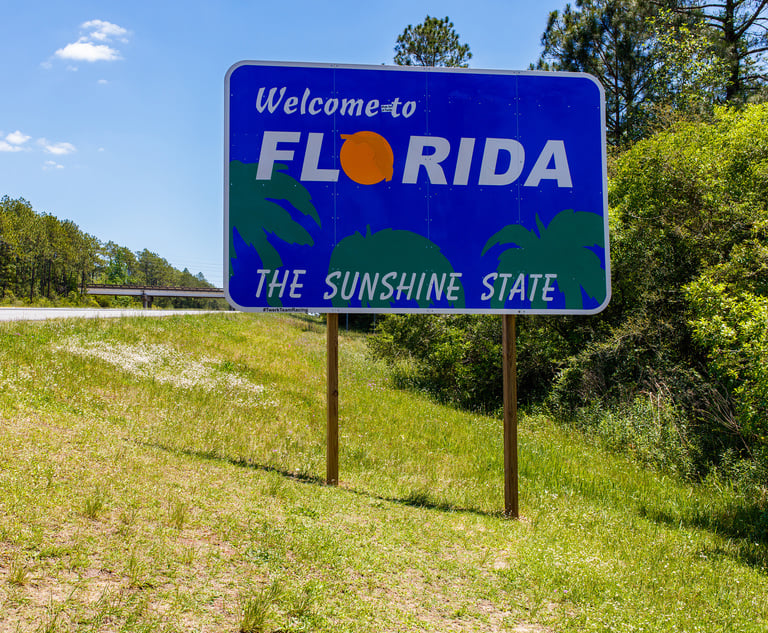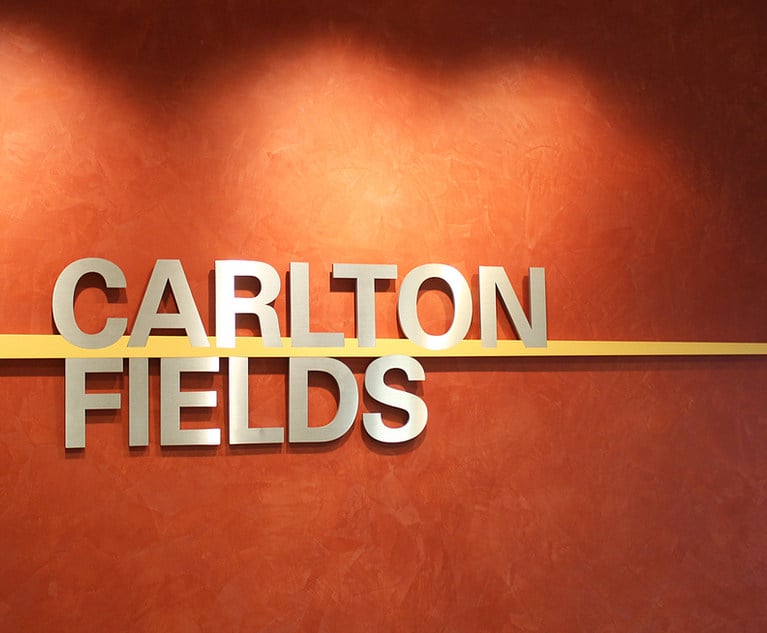Nason Yeager Competes With Big Law on the Other Side of the Table
Gary Gerson, president of Nason, Yeager, Gerson, White & Lioce, gives an overview of the law firm, which has two offices in Palm Beach County.How…
April 25, 2018 at 09:00 AM
5 minute read

Gary Gerson, president of Nason, Yeager, Gerson, White & Lioce, gives an overview of the law firm, which has two offices in Palm Beach County.
How big is your firm, where is it located, and what are its primary areas of practice and focus? Nason Yeager has 32 lawyers with offices in Palm Beach Gardens and Boca Raton. We are a full-service law firm with practice groups in corporate, real property, litigation, environmental, land-use, governmental, tax, securities and administrative law.
Please explain your firm's governance structure and compensation model. Firm governance is led by a four-person executive board that reports to the board of directors, which consists of the equity partners of the firm. Our compensation structure among partners is performance-based and formula-driven with credit factored for originations, billable hours and collections.
What do you view as the two biggest opportunities for your firm, and what are the two biggest threats? The biggest opportunity for our firm is positioning itself in the Florida legal services marketplace as a high-quality alternative to large firms, also referred to as Big Law. In the marketplace, we compete with Big Law on the other side of transactions and disputes. We offer the same top-notch counsel but with greater cost-effective options. However, another focus is on attracting and retaining experienced, well-established attorneys looking for an entrepreneurial culture and a transparent, formula-driven compensation structure that greatly rewards origination and productivity. The biggest threat always revolves around changes in the marketplace, including economic downturns, which could impact the transactional side of our practice. Economic downturns reveal our firm's ability to react to differing client needs such as workouts and litigation.
After the recession hit, the prevailing theory was that midsize firms would start to see more work come their way from large clients who could no longer justify paying Big Law rates. What has been your experience? We have always marketed ourselves as a cost-effective and flexible alternative to Big Law. As a result, we attract clients throughout Florida and the country looking for alternatives. For both our clients and the firm, this has been a rewarding and valuable strategy.
Are your clients pushing for more alternative fee arrangements, and if so what types? Is your firm amenable to those requests? At times, clients look for alternative and flexible fee structures. Alternative structures typically include flat fees or monthly retainers. We are amenable to alternative fee arrangements and, in fact, do have a number of them in place with existing clients. We are a relationship-driven law firm looking to establish longstanding relationships with our clients. This enables our firm flexibility in establishing customized alternative fee arrangements that meet the client's needs.
There is much debate around how law firms can foster the next generation of legal talent. What advantages and disadvantages do midsize firms have in attracting and retaining young lawyers, particularly millennials? The advantages and disadvantages of a midsize firm attracting and retaining lawyers has been very interesting for us. While larger firms may offer higher salaries, a midsize firm better enables attorneys to develop and grow their book of business, thus giving them a better long-term outlook to develop their own practice and make money. Big Law is typically not equipped to handle smaller or evolving clients like ours, while offering attractive hourly rates. That is our major advantage.
Does your firm employ any nonlawyer professionals in high-level positions (e.g. COO, business development officer, chief strategy officer, etc.)? If so, why is it advantageous to have a nonlawyer in that role? If not, have you considered hiring any? We do not employ nonlawyer professionals in high-level positions. However, we do use outside professionals, on a contract basis, to provide assistance in marketing, information technology support and business development. We are continually evaluating opportunities to upgrade our firm's capabilities and support services.
What if any technology advancements have you made in your firm in recent years? What are the challenges in implementing tech changes? We are committed to becoming paperless for several reasons and have made the investment in systems, software and training to take advantage of the efficiencies and cost savings. The challenges of implementing new technologies is the acceptance and training of our attorneys and staff. If we can show them it's better, faster and less costly, we get their buy-in.
What would you say is the most innovative thing your firm has done recently, whether it be internal operations, how you work with clients, etc.? The most innovative thing that we have done recently is related to our physical space. We expanded operations after being in West Palm Beach for over 50 years. We moved our main office to Palm Beach Gardens and opened a Boca Raton office. That has enabled us to better cover Palm Beach County, substantially upgrade our physical plant, enhance the depth of our expertise, as well as manage the consistent growth the firm has been experiencing for almost a decade more effectively.
Does your firm have a succession plan in place? If so, what challenges do you face in trying to execute that plan? If you don't currently have a plan, is it an issue your firm is thinking about? We have spent quite a bit of time and effort on the implementation of a succession plan. Our firm is almost 60 years old, and we have been focused on developing leaders capable of growing and leading the firm. We believe that we have properly hired and mentored our younger lawyers to step up as practitioners and leaders.
This content has been archived. It is available through our partners, LexisNexis® and Bloomberg Law.
To view this content, please continue to their sites.
Not a Lexis Subscriber?
Subscribe Now
Not a Bloomberg Law Subscriber?
Subscribe Now
NOT FOR REPRINT
© 2025 ALM Global, LLC, All Rights Reserved. Request academic re-use from www.copyright.com. All other uses, submit a request to [email protected]. For more information visit Asset & Logo Licensing.
You Might Like
View All

'Never Been More Dynamic': Big Law Leaders Reflect on 2024 and Expectations Next Year
7 minute read
Florida-Based Law Firms Start to Lag, As New York Takes a Bigger Piece of Deals
3 minute read
Trending Stories
- 1Data Breach Lawsuit Against Byte Federal Among 1,500 Targeting Companies in 2024
- 2Counterfeiters Ride Surge in Tabletop Games’ Popularity, Challenging IP Owners to Keep Up
- 3Health Care Data Breach Class Actions Saw December Surge in NY Courts
- 4Florida Supreme Court Disbars 3, Suspends 11, Reprimands 1 in Final Disciplinary Order of 2024
- 5Chief Justice Roberts Ends Year With Defense Against 'Illegitimate' Attacks on Judiciary
Who Got The Work
Michael G. Bongiorno, Andrew Scott Dulberg and Elizabeth E. Driscoll from Wilmer Cutler Pickering Hale and Dorr have stepped in to represent Symbotic Inc., an A.I.-enabled technology platform that focuses on increasing supply chain efficiency, and other defendants in a pending shareholder derivative lawsuit. The case, filed Oct. 2 in Massachusetts District Court by the Brown Law Firm on behalf of Stephen Austen, accuses certain officers and directors of misleading investors in regard to Symbotic's potential for margin growth by failing to disclose that the company was not equipped to timely deploy its systems or manage expenses through project delays. The case, assigned to U.S. District Judge Nathaniel M. Gorton, is 1:24-cv-12522, Austen v. Cohen et al.
Who Got The Work
Edmund Polubinski and Marie Killmond of Davis Polk & Wardwell have entered appearances for data platform software development company MongoDB and other defendants in a pending shareholder derivative lawsuit. The action, filed Oct. 7 in New York Southern District Court by the Brown Law Firm, accuses the company's directors and/or officers of falsely expressing confidence in the company’s restructuring of its sales incentive plan and downplaying the severity of decreases in its upfront commitments. The case is 1:24-cv-07594, Roy v. Ittycheria et al.
Who Got The Work
Amy O. Bruchs and Kurt F. Ellison of Michael Best & Friedrich have entered appearances for Epic Systems Corp. in a pending employment discrimination lawsuit. The suit was filed Sept. 7 in Wisconsin Western District Court by Levine Eisberner LLC and Siri & Glimstad on behalf of a project manager who claims that he was wrongfully terminated after applying for a religious exemption to the defendant's COVID-19 vaccine mandate. The case, assigned to U.S. Magistrate Judge Anita Marie Boor, is 3:24-cv-00630, Secker, Nathan v. Epic Systems Corporation.
Who Got The Work
David X. Sullivan, Thomas J. Finn and Gregory A. Hall from McCarter & English have entered appearances for Sunrun Installation Services in a pending civil rights lawsuit. The complaint was filed Sept. 4 in Connecticut District Court by attorney Robert M. Berke on behalf of former employee George Edward Steins, who was arrested and charged with employing an unregistered home improvement salesperson. The complaint alleges that had Sunrun informed the Connecticut Department of Consumer Protection that the plaintiff's employment had ended in 2017 and that he no longer held Sunrun's home improvement contractor license, he would not have been hit with charges, which were dismissed in May 2024. The case, assigned to U.S. District Judge Jeffrey A. Meyer, is 3:24-cv-01423, Steins v. Sunrun, Inc. et al.
Who Got The Work
Greenberg Traurig shareholder Joshua L. Raskin has entered an appearance for boohoo.com UK Ltd. in a pending patent infringement lawsuit. The suit, filed Sept. 3 in Texas Eastern District Court by Rozier Hardt McDonough on behalf of Alto Dynamics, asserts five patents related to an online shopping platform. The case, assigned to U.S. District Judge Rodney Gilstrap, is 2:24-cv-00719, Alto Dynamics, LLC v. boohoo.com UK Limited.
Featured Firms
Law Offices of Gary Martin Hays & Associates, P.C.
(470) 294-1674
Law Offices of Mark E. Salomone
(857) 444-6468
Smith & Hassler
(713) 739-1250






